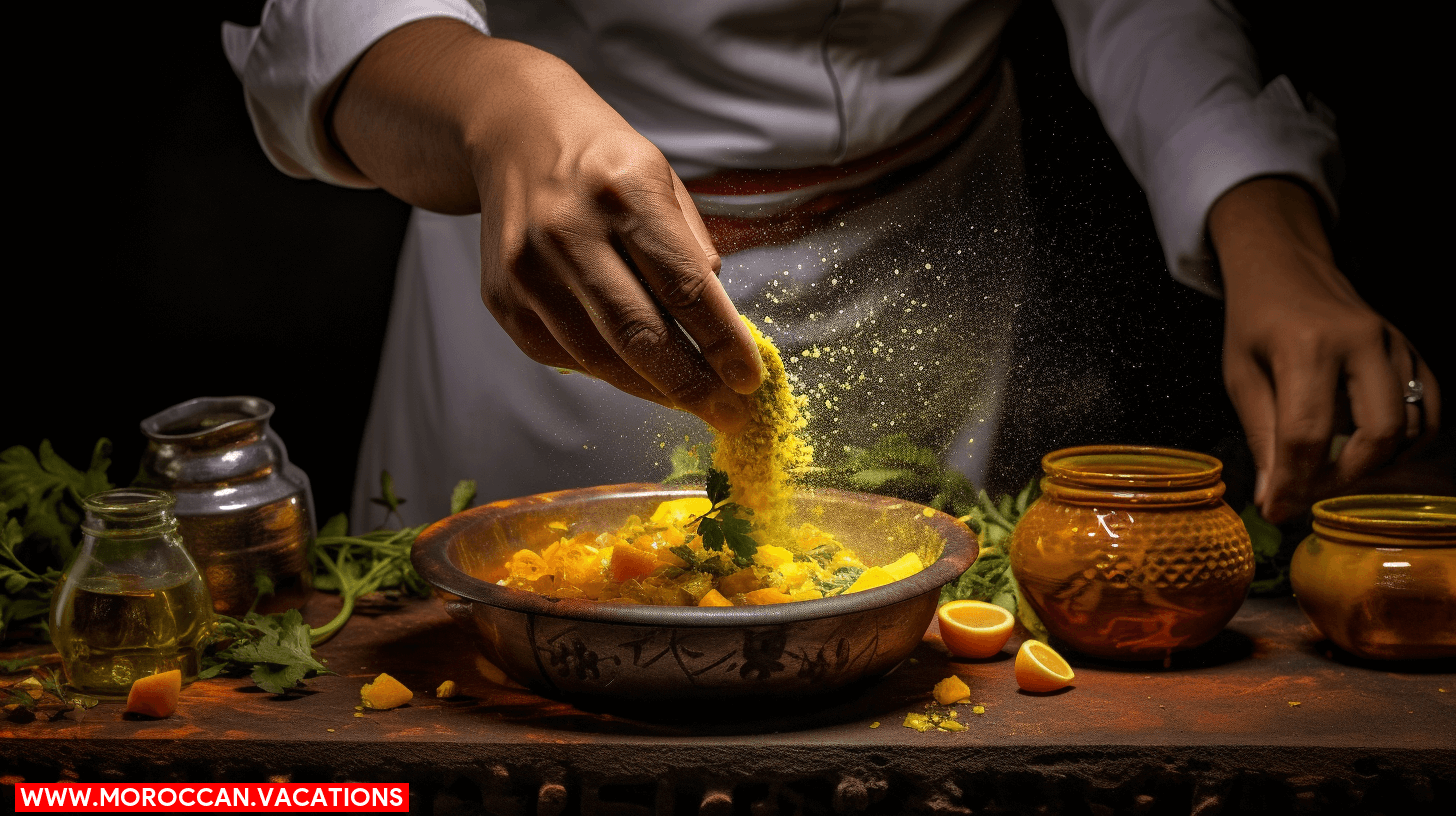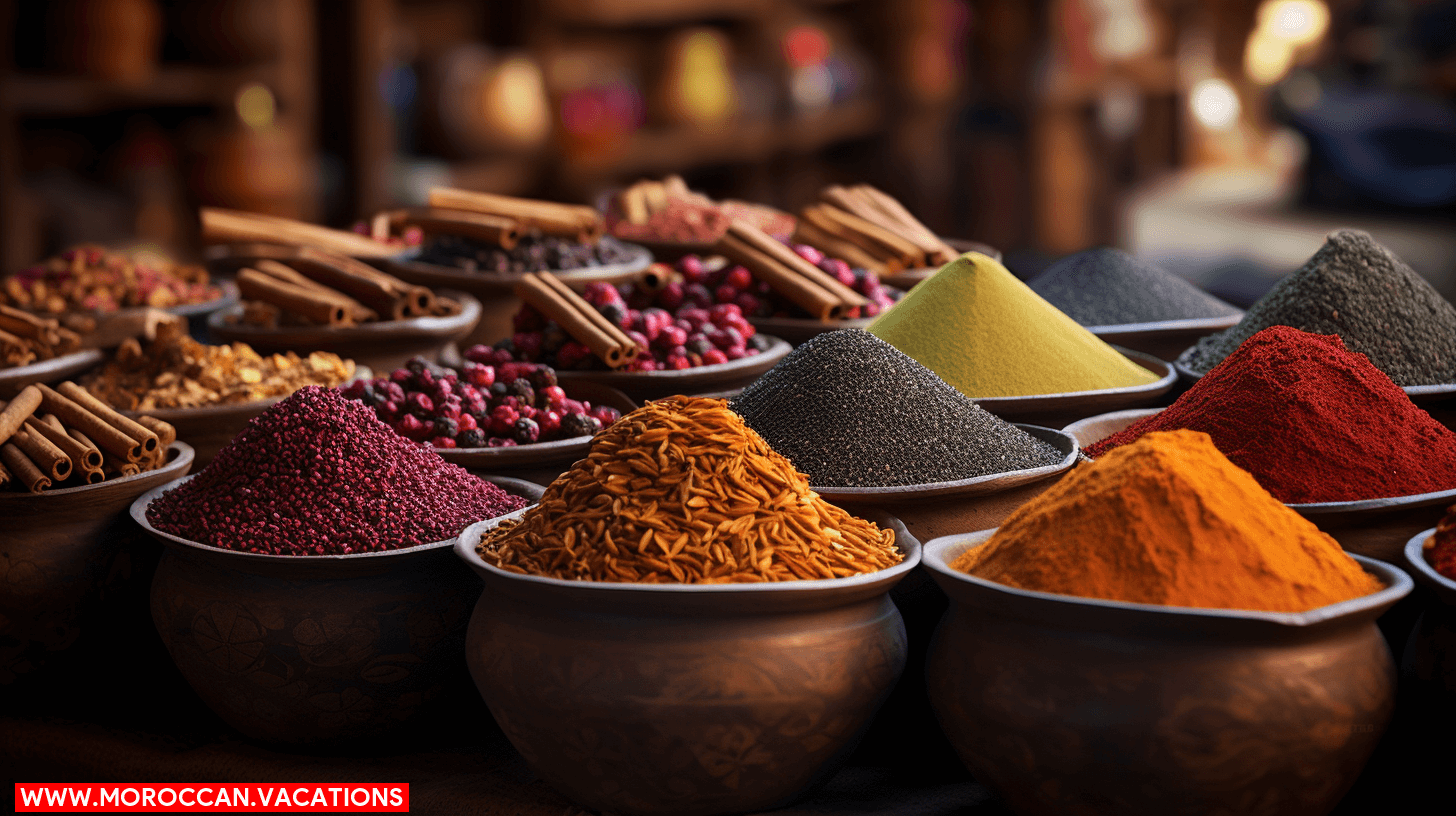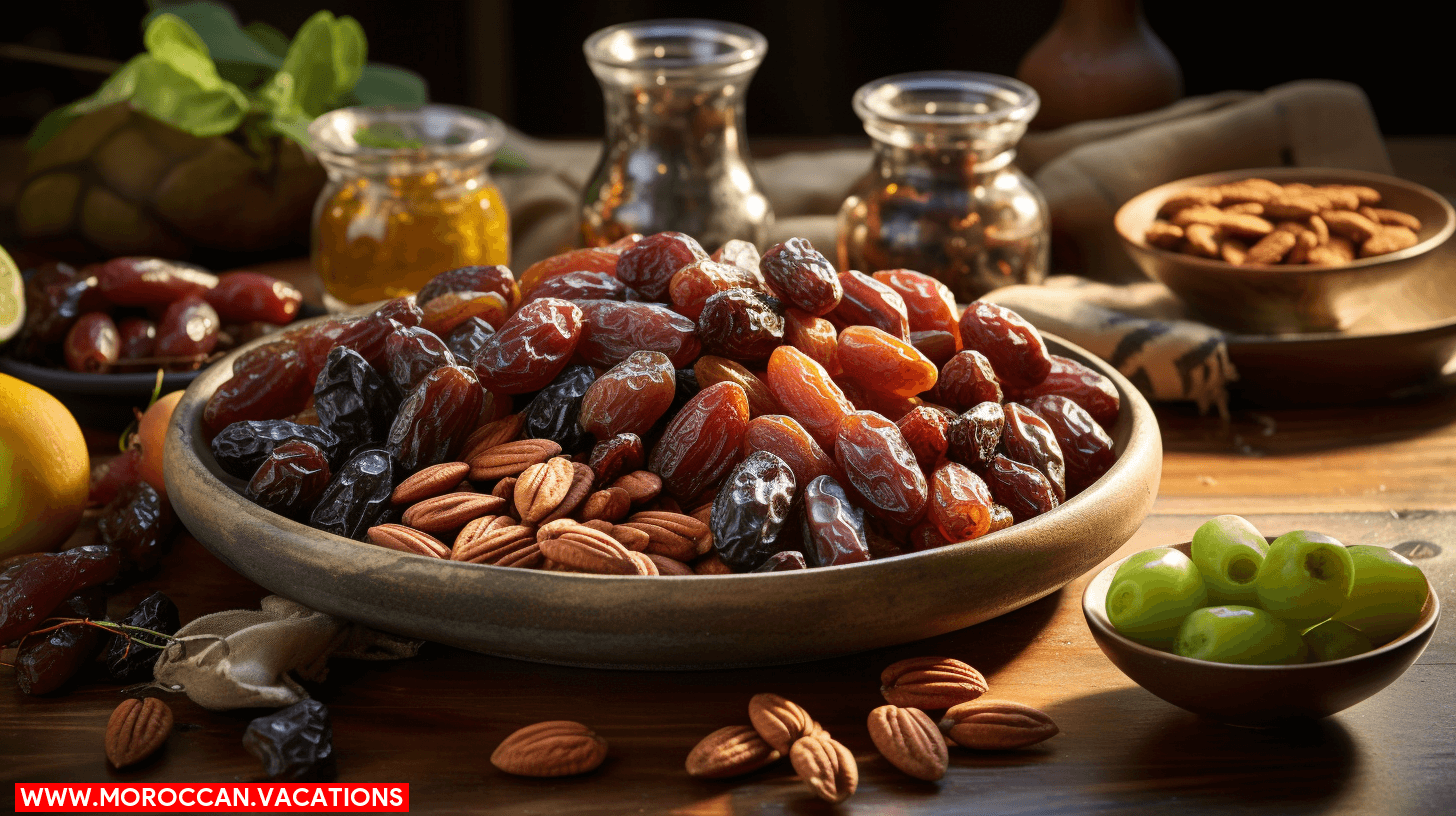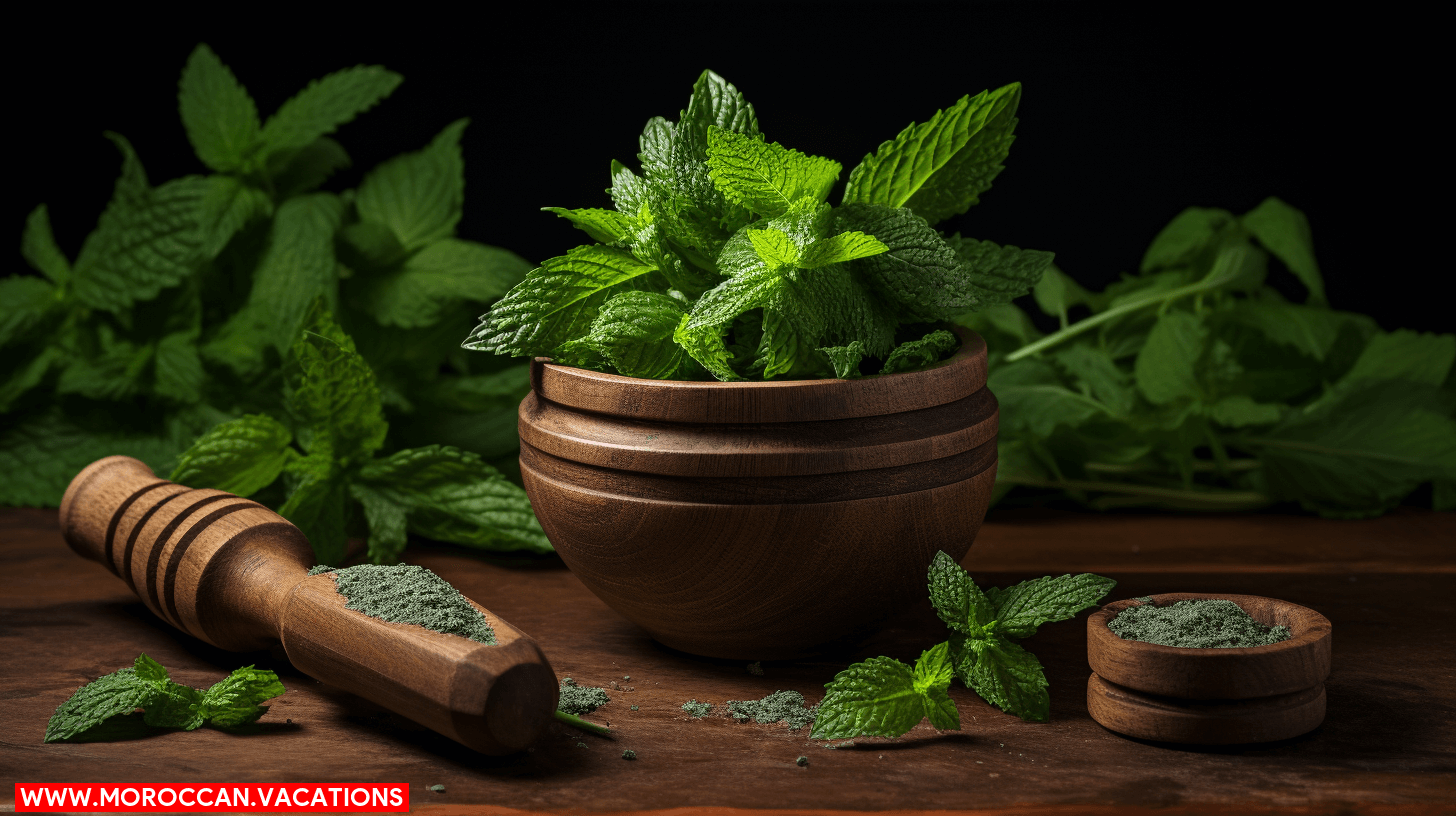Exploring the Power of Saffron
Looking to boost your health and tantalize your taste buds? Look no further than the rich and exotic flavors of Moroccan cuisine. In our cooking classes, you’ll discover the incredible health benefits of Moroccan ingredients. From the powerful saffron to the immune-boosting ginger, each ingredient offers a world of wellness. Get ready to unlock the secrets of cumin’s anti-inflammatory effects and embrace the heart-healthy benefits of olive oil. With these ingredients, you’ll be on your way to a healthier, more vibrant you. Let’s start cooking!
Discover the numerous health benefits of saffron, a Moroccan ingredient that can enhance your well-being and culinary experience. Saffron, known as the “golden spice,” is derived from the flower of Crocus sativus. Apart from its distinct flavor and vibrant color, saffron has been used for centuries in traditional medicine due to its many health-promoting properties.
In terms of cultivation, saffron requires a specific climate and soil conditions, making Morocco an ideal location for its growth. Moroccan saffron is highly sought after for its superior quality and flavor. In fact, Morocco is one of the largest saffron producers in the world.
When it comes to health benefits, saffron is known for its powerful antioxidant properties. These antioxidants help protect your cells from damage caused by free radicals, reducing the risk of chronic diseases such as heart disease and cancer. Additionally, saffron has been shown to have anti-inflammatory effects, which can help alleviate symptoms of conditions like arthritis.
Incorporating saffron into your diet is easy with a variety of saffron recipes available. From savory dishes like Moroccan tagines to sweet treats like saffron-infused desserts, there are endless possibilities to explore. So why not add a pinch of saffron to your next culinary creation and experience the many health benefits this Moroccan ingredient has to offer?
Harnessing the Benefits of Turmeric


To continue exploring the health benefits of Moroccan ingredients, let’s now delve into harnessing the benefits of turmeric, another powerful spice commonly used in Moroccan cooking classes. Turmeric is not only known for its vibrant yellow color, but also for its numerous health benefits. Here are five reasons why you should incorporate turmeric into your cooking:
- Anti-inflammatory properties: Turmeric contains a compound called curcumin, which has been shown to reduce inflammation in the body. This can be especially beneficial for those suffering from conditions such as arthritis.
- Boosts immune system: Turmeric has antimicrobial and antiviral properties that can help strengthen your immune system. Adding turmeric to your meals can help keep you healthy and ward off infections.
- May improve brain function: Studies have suggested that curcumin in turmeric may enhance brain function and improve memory. Including turmeric in your diet could potentially help prevent cognitive decline.
- Supports digestion: Turmeric has long been used in traditional medicine to aid digestion. It stimulates the production of bile, which helps break down fats and aids in the absorption of nutrients.
- Promotes heart health: Turmeric has been linked to improved heart health due to its ability to reduce cholesterol levels and prevent the buildup of plaque in the arteries.
Incorporating turmeric into your cooking is not only delicious but also provides a range of health benefits. Try adding it to curries, stir-fries, or even smoothies to reap its many advantages.
Discover the Immune-Boosting Properties of Ginger
Now let’s explore the immune-boosting properties of ginger, another Moroccan ingredient commonly used in cooking classes. Ginger has been used for centuries in traditional medicine for its various health benefits. One of its key properties is its ability to boost digestion. Ginger contains compounds called gingerols, which stimulate the production of digestive enzymes, helping to break down food and promote smoother digestion. By improving digestion, ginger can enhance nutrient absorption, support gut health, and strengthen the immune system.
In addition to boosting digestion, ginger also has anti-inflammatory properties that can help reduce pain. The active compounds in ginger, such as gingerol and zingerone, possess analgesic and anti-inflammatory effects. Studies have shown that ginger can help alleviate muscle soreness, joint pain, and menstrual cramps. It works by inhibiting the production of inflammatory molecules and reducing oxidative stress in the body.
To incorporate ginger into your diet, you can add it to your meals as a spice or use it to make ginger tea. You can also find ginger supplements in the form of capsules or extracts. However, it is important to note that ginger may interact with certain medications, so it’s always advisable to consult with a healthcare professional before adding ginger supplements to your routine.
The Anti-Inflammatory Effects of Cumin


Cumin, a Moroccan ingredient commonly used in cooking classes, offers impressive anti-inflammatory effects that can benefit your health. Exploring the culinary uses of cumin and understanding its role in traditional Moroccan dishes can help you incorporate this flavorful spice into your cooking routine. Here are five reasons why you should consider adding cumin to your diet:
- Reduces inflammation: Cumin contains compounds like thymoquinone and cuminaldehyde, which have demonstrated anti-inflammatory properties. Consuming cumin regularly may help alleviate symptoms of inflammatory conditions like arthritis and asthma.
- Boosts digestion: Cumin has been traditionally used to aid digestion. It stimulates the production of digestive enzymes, promotes the secretion of bile, and helps reduce bloating and indigestion.
- Supports immune function: Cumin is rich in antioxidants, such as vitamin C and vitamin E, which help protect your cells from damage caused by free radicals. A strong immune system is crucial for overall health and can help prevent chronic diseases.
- Enhances nutrient absorption: Cumin’s active compounds can improve the absorption of nutrients in your gut. This means that incorporating cumin into your meals can help you get the most out of the other healthy ingredients you consume.
- Adds flavor to your dishes: Cumin has a warm, earthy, and slightly nutty flavor that can enhance the taste of your dishes. From soups and stews to roasted vegetables and marinades, cumin can be a versatile and delicious addition to your meals.
Unlocking the Health Benefits of Cinnamon
Cinnamon, another Moroccan ingredient commonly used in cooking classes, offers a range of health benefits that can complement the anti-inflammatory effects of cumin. Not only does it add a warm and aromatic flavor to dishes, but it also provides numerous advantages for your well-being.
One of the key benefits of cinnamon is its role in blood sugar control. Research has shown that cinnamon can help improve insulin sensitivity, which is crucial for maintaining stable blood sugar levels. By incorporating cinnamon into your diet, you may be able to better regulate your blood sugar and reduce the risk of developing conditions such as type 2 diabetes.
Furthermore, recent studies have also explored cinnamon’s potential as an anti-cancer agent. Cinnamon contains compounds that have been found to inhibit the growth of cancer cells and induce cell death in certain types of cancer. While more research is needed to fully understand the mechanisms behind this effect, incorporating cinnamon into your meals may have protective effects against cancer.
To give you a clear overview of the health benefits of cinnamon, here is a table outlining its potential advantages:
| Health Benefit | Description |
| Blood sugar control | Improves insulin sensitivity, aiding in the regulation of blood sugar levels |
| Anti-cancer properties | Contains compounds that inhibit cancer cell growth and induce cell death |
Embracing the Nutritional Value of Dates


To fully embrace the nutritional value of dates, you can incorporate this versatile ingredient into your meals and experience their health benefits firsthand. Dates are not only delicious, but they are also packed with nutrients that can contribute to your overall well-being. Here are some ways you can incorporate dates into your cooking:
- Sweet treats: Dates are naturally sweet, making them a great substitute for refined sugar in desserts like cakes, cookies, and energy bars.
- Smoothies: Add dates to your favorite smoothie recipes for a natural sweetener and a boost of fiber.
- Salad dressings: Blend dates with olive oil, vinegar, and herbs to create a sweet and tangy dressing for your salads.
- Stuffed appetizers: Stuff dates with cheese, nuts, or even bacon for a delightful appetizer that combines sweet and savory flavors.
- Tagines: Dates are a key ingredient in many traditional Moroccan tagine recipes, adding a natural sweetness and depth of flavor to the dish.
Incorporating dates into your meals not only adds a delicious twist, but it also provides you with essential nutrients like fiber, potassium, and antioxidants. So go ahead and get creative with dates in your cooking, and enjoy the health benefits that this versatile ingredient has to offer.
The Heart-Healthy Benefits of Olive Oil
To experience the heart-healthy benefits of olive oil, incorporate this versatile ingredient into your cooking classes and discover the many ways it can enhance your meals. Olive oil has long been recognized for its positive impact on cardiovascular health. The rich content of monounsaturated fats in olive oil makes it an excellent choice for heart disease prevention.
Here are some of the benefits of olive oil for heart disease prevention:
| Benefits | Description |
| Reduces LDL | The monounsaturated fats in olive oil help lower LDL cholesterol levels, which is known as the “bad” cholesterol. By reducing LDL, olive oil promotes heart health and lowers the risk of heart disease. |
| Increases HDL | Olive oil has been found to increase HDL cholesterol levels, known as the “good” cholesterol. Higher levels of HDL can help protect against heart disease. |
| Anti-inflammatory properties | Olive oil contains antioxidants that have anti-inflammatory effects. Chronic inflammation can contribute to heart disease, and the anti-inflammatory properties of olive oil can help reduce this risk. |
| Protects blood vessels | Olive oil contains polyphenols, which have been shown to protect blood vessels from damage and improve their function. This can help maintain healthy blood pressure levels and reduce the risk of cardiovascular disease. |
Incorporating olive oil into your cooking classes can not only add flavor and depth to your dishes but also provide your students with the opportunity to learn about the heart-healthy benefits of this incredible ingredient.
Harnessing the Healing Properties of Mint


Discover the therapeutic qualities of mint and how incorporating this aromatic herb into your cooking classes can provide numerous health benefits. Mint has been used for centuries for its healing properties, and it continues to be a popular ingredient in traditional medicine and culinary practices. Here are five reasons why you should consider harnessing the healing properties of mint in your cooking classes:
- Digestive Aid: Mint has long been known for its ability to soothe an upset stomach and relieve indigestion. It can help relax the muscles of the gastrointestinal tract, promoting healthy digestion and reducing discomfort.
- Mental Clarity: The aroma of mint has been shown to have a stimulating effect on the brain, promoting mental clarity and improving focus. Incorporating mint into your cooking classes can help create a calm and focused environment for learning and creativity.
- Respiratory Health: Mint contains menthol, which has a cooling effect on the respiratory system. It can help alleviate symptoms of respiratory conditions such as congestion, cough, and asthma.
- Antioxidant Powerhouse: Mint is rich in antioxidants, which help protect the body against damage from harmful free radicals. Including mint in your cooking classes can provide your participants with a delicious and nutritious way to boost their antioxidant intake.
- Stress Relief: Mint has natural stress-relieving properties and can help promote relaxation. By incorporating mint into your cooking classes, you can create a soothing and calming environment for your participants.


Samira Amrani
The passionate author behind Moroccan Vacations, sharing her expertise and love for Moroccan culture, cuisine, and travel experiences to inspire wanderlust in every reader.
Introducing Ayoub Karbachi, a brilliant wordsmith and curator of the Moroccan Vacations website. Prepare to immerse yourself in mesmerizing narratives and extraordinary moments, as he unveils the allure of Morocco's captivating destinations like never before.
Related Articles
Vegetarian and Vegan Options in Marrakesh Street Food
Traditional Moroccan Vegetarian Tagines Are you tired of feeling limited when it comes to finding vegetarian and vegan options in Marrakesh's bustling street food scene? Well, we've got some good news for you! Get ready to embark on a culinary adventure filled with...
Street Food Safety Tips for Enjoying Marrakesh's Local Cuisine
Research Local Food Regulations Did you know that Marrakesh is home to a vibrant street food scene, offering a rich variety of local cuisine? To fully enjoy these culinary delights while ensuring your health and safety, it's important to follow a few simple tips. In...
The Influence of Arab Cuisine on Moroccan Culinary Traditions
Historical Background of Arab Influence Imagine yourself transported to the vibrant streets of Morocco, where the tantalizing aroma of spices fills the air and the sizzle of food cooking on open flames entices your senses. In this culinary paradise, the influence of...


